高考英语一轮复习英语语法专题复习:时态和语态课件(共45张)
文档属性
| 名称 | 高考英语一轮复习英语语法专题复习:时态和语态课件(共45张) |  | |
| 格式 | pptx | ||
| 文件大小 | 814.0KB | ||
| 资源类型 | 教案 | ||
| 版本资源 | 通用版 | ||
| 科目 | 英语 | ||
| 更新时间 | 2022-07-08 17:57:44 | ||
图片预览

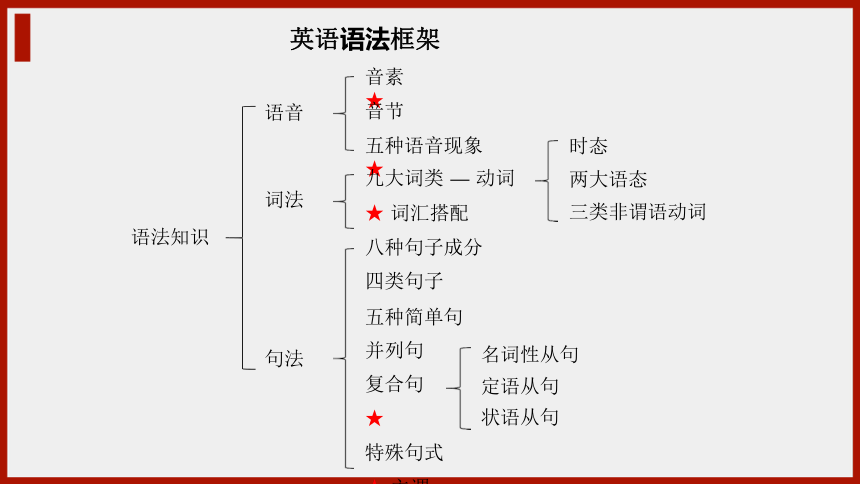
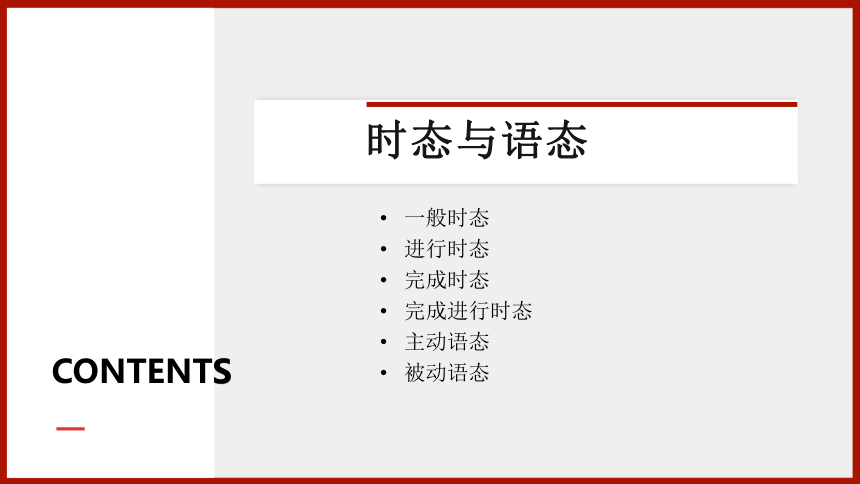
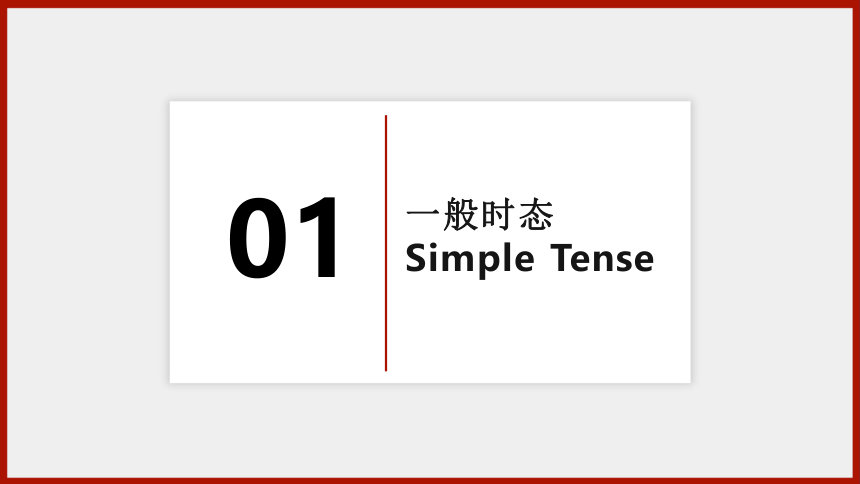
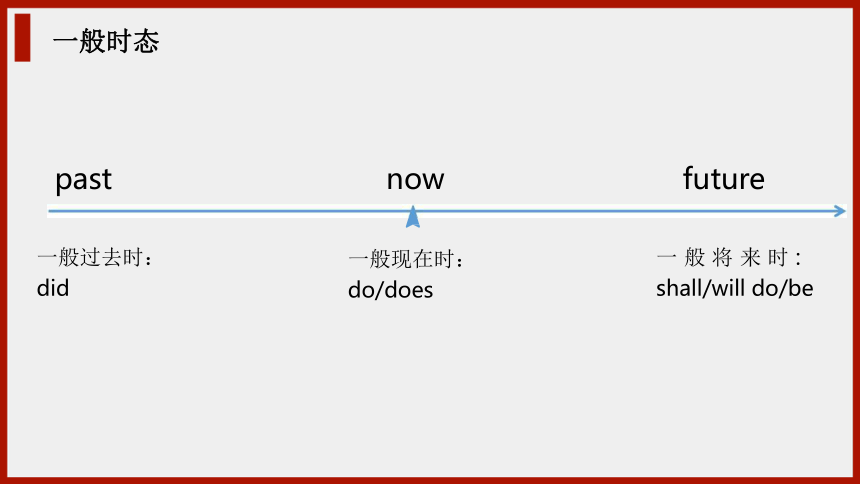
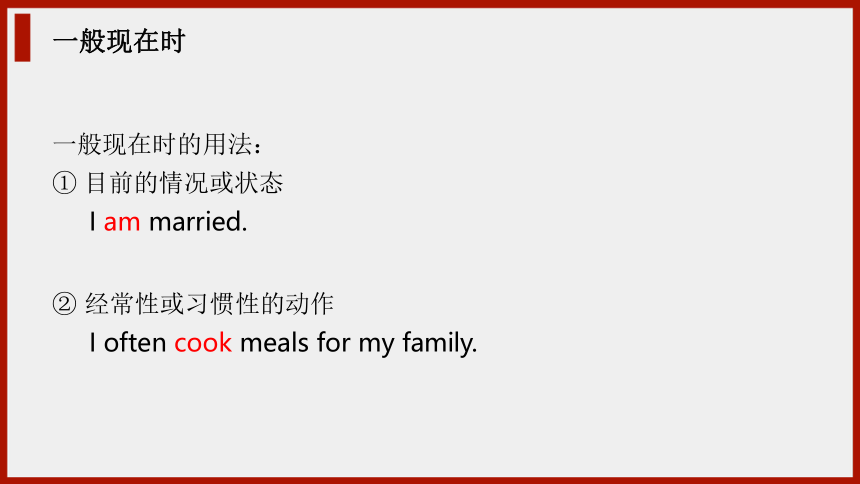
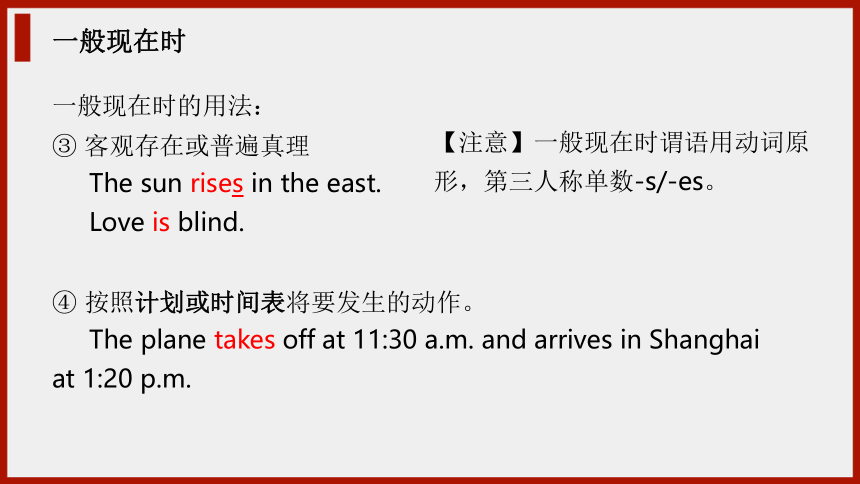
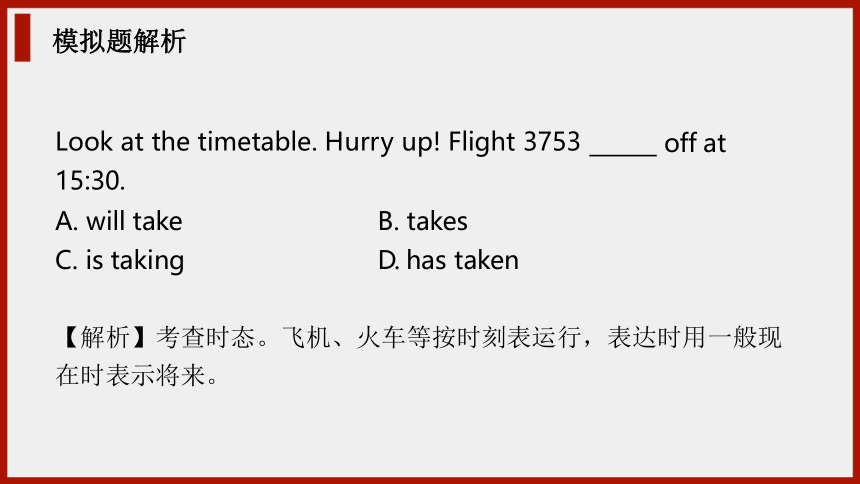
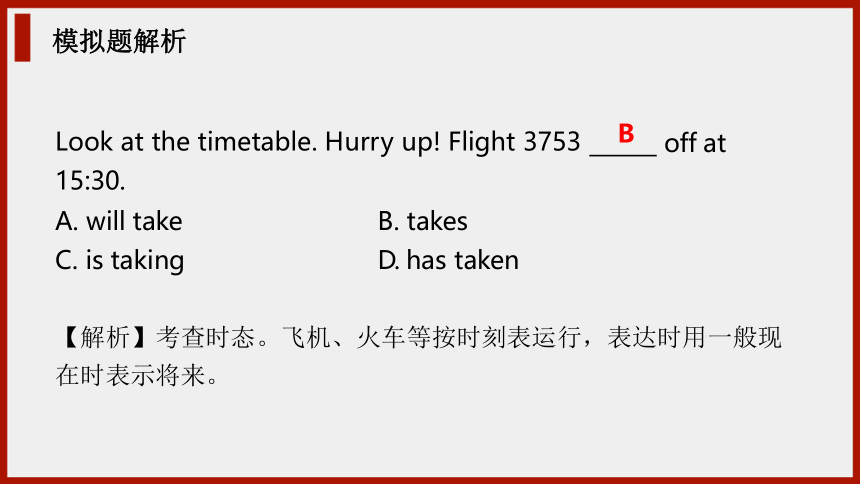
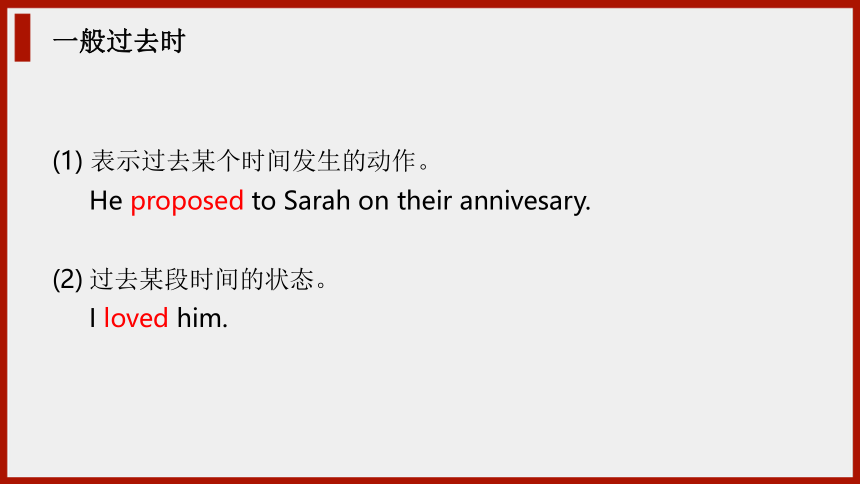
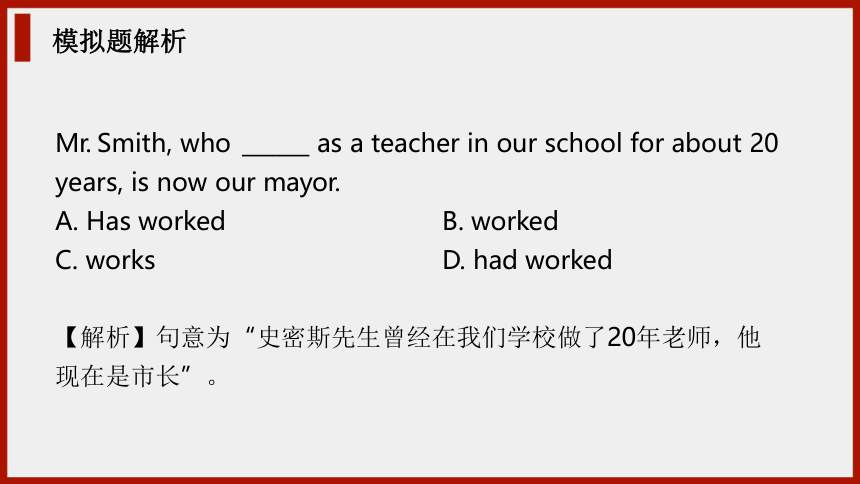

文档简介
(共45张PPT)
【高中语法】
时态与语态
英语语法框架
语法知识
语音
音素★
音节
五种语音现象★
句法
词法
九大词类 动词★ 词汇搭配
时态
两大语态
三类非谓语动词
并列句 复合句★
特殊句式★ 主谓一致
八种句子成分 四类句子
五种简单句
名词性从句 定语从句 状语从句
CONTENTS
时态与语态
一般时态
进行时态
完成时态
完成进行时态
主动语态
被动语态
01
一般时态
Simple Tense
now
future
past
一般过去时: did
一 般 将 来 时 : shall/will do/be
一般现在时: do/does
一般时态
一般现在时的用法:
① 目前的情况或状态 I am married.
② 经常性或习惯性的动作
I often cook meals for my family.
一般现在时
一般现在时的用法:
③ 客观存在或普遍真理
The sun rises in the east. Love is blind.
④ 按照计划或时间表将要发生的动作。
The plane takes off at 11:30 a.m. and arrives in Shanghai at 1:20 p.m.
一般现在时
【注意】一般现在时谓语用动词原 形,第三人称单数-s/-es。
off at
Look at the timetable. Hurry up! Flight 3753 15:30.
A. will take
C. is taking
B. takes
D. has taken
【解析】考查时态。飞机、火车等按时刻表运行,表达时用一般现 在时表示将来。
模拟题解析
off at
Look at the timetable. Hurry up! Flight 3753 15:30.
A. will take
C. is taking
B. takes
D. has taken
【解析】考查时态。飞机、火车等按时刻表运行,表达时用一般现 在时表示将来。
B
模拟题解析
表示过去某个时间发生的动作。
He proposed to Sarah on their annivesary.
过去某段时间的状态。 I loved him.
一般过去时
Mr. Smith, who
as a teacher in our school for about 20
years, is now our mayor.
A. Has worked
C. works
B. worked
D. had worked
【解析】句意为“史密斯先生曾经在我们学校做了20年老师,他 现在是市长”。
模拟题解析
Mr. Smith, who
as a teacher in our school for about 20
years, is now our mayor.
A. Has worked
C. works
B. worked
D. had worked
【解析】句意为“史密斯先生曾经在我们学校做了20年老师,他 现在是市长”。
B
模拟题解析
一般过去时用法:
① 表肯定:主语+动词过去式+其他 He went shopping yesterday.
② 表否定:主语+did not (didn't)+动词原形+其他 He didn't go shopping yesterday.
③一般疑问:Did+主语+动词原形+其他 Did he go shopping yesterday
④特殊疑问句:疑问词+did+主语+动词原形+其他 What did he do yesterday
一般过去时
表示将来某个时间要发生的动作或存在的状态。 I will always love you.
I will go shopping with you tomorrow.
一般将来时
一般将来时的用法:
① will/shall+动词原形 He will be back soon.
② 表否定:主语+will not (won't)+动词原形+其他 He won't go shopping tomorrow.
③ 一般疑问:Will+主语+动词原形+其他 Will he go shopping tomorrow
④ 特殊疑问句:疑问词+will+主语+动词原形+其他 What will he do tomorrow
一般将来时
02
进行时态
Continuous Tense
now
future
past
过去进行时: was/were doing
将 来 进 行 时 : will/shall be doing
现在进行时: am/is/are doing
进行时态
用法:
① 表说话的同时或现在时段动作正在进行 She is making fire now.
They are planting trees on the hill these days.
② 表计划或安排将要发生的动作
Jane and Berry are going on holiday in a few days.
③ 表重复的动作
She is always complaining. (抱怨口吻)
The train is arriving late almost every day this summer.
现在进行时态
过去进行时态
用法:
① 常和时间状语then, at that time/moment等连用。 We were watching TV at that time.
② 与when, while, as引导的过去时间状语连用,延续性动词用过去进行时, 非延续性动词用一般过去时。
When I saw him he was cleaning his room.
将来进行时态
用法:
① 将来某个时间正在进行的动作,或会延续到将来的动作 What will you be doing at this time next Monday.
I wonder if it will still be raining this afternoon.
② 将来预定的动作、预测或打算 Tommorrow I will be flying to Bambay.
③ 表原因或结果
Stop the child or he will be falling over.
03
完成时态
Perfect Tense
now
future
完成时态
过去完成时 had done
past
现在完成时 have/has done
将来完成时 will/shall have done
现在完成时
now
future
past
现在完成时 have/has done
用法:① 现在完成时表示从过去某一时间持续到现在的动作 We have known each other since 2007.
② 发生在过去的动作对现在留下了某种影响或结果 I have already finished my homework.
conscious of her moral obligations as a citizen.
Marsha was and always will be
Marsha has to be and always will be
Marsha had been and will always be
Marsha has been and will always be
【解析】句意为“Marsha一直记得而且也将永远记得她作为一个 公民所应有的明白自己的道德责任。”
真题解析
D conscious of her moral obligations as a citizen.
Marsha was and always will be
Marsha has to be and always will be
Marsha had been and will always be
Marsha has been and will always be
【解析】句意为“Marsha一直记得而且也将永远记得她作为一个 公民所应有的明白自己的道德责任。”
真题解析
now
future
过去完成时 had done
past
过去完成时
过去完成时指过去已经完成,“过去的过去”。 用法:必须与表示过去某一时间点的时间状语连用
When I woke up, it had stopped raining.
By the end of last year, my father had worked in the company for 20 years.
now
future
past
完成时态
将来完成时 will/shall have done
将来某一时间前已经完成的动作 (“到时已经完成”)。 用法:必须与将来的时间点连用。
We shall have learned 12 units by the end of this term. We will have been married a year on June 25th.
04
完成进行时态
Perfect
Continuous Tense
now
future
现在完成进行时 have/has been doing
过去完成进行时 had been doing
past
将来完成时 will/shall have done
完成进行时态
now
future
past
现在完成进行时
现在完成进行时 have/has been doing
过去开始的动作,到现在还在延续或重复
I have been waiting for you for about one hour.
We have been discussing the matter several times this year.
now
future
past
过去完成进行时
过去完成进行时 had been doing
过去某个时间之前一直进行的动作
I had been looking for it for days before I found it.
At that point, he realized what he had been doing all along.
now
future
past
将来完成进行时 will/shall have been doing
完成进行时态
动作在某种情况下一直持续到将来某个时间仍未结束。
By the end of this year he will have been acting for thirty years.
05
语态 Voice
语态
英语中有两种语态:主动语态和被动语态。
语态是通过动词的变化表现出来的。
主动语态:谓语的动作源自主语,施加于宾语。
I made mistakes.
被动语态:助动词be + (及物动词)过去分词 Mistakes were made.
A. gave
C. give
B. giving
D. be given
【解析】考查动词的语态。and前后连接相同格式的句子成分。后 半句的主语是代词they,谓语动词是give,根据句意应是“他们 被提供机会决定是否要参与研究”,故使用被动语态。
Potential subjects should be informed of the research and
an opportunity to decide if they want to participate.
真题解析
A. gave
C. give
B. giving
D. be given
【解析】考查动词的语态。and前后连接相同格式的句子成分。后 半句的主语是代词they,谓语动词是give,根据句意应是“他们 被提供机会决定是否要参与研究”,故使用被动语态。
Potential subjects should be informed of the research and
D an opportunity to decide if they want to participate.
真题解析
My aunt brought me up.
He gave the boy an apple.
语态
主动语态改为被动语态的方法
Many people speak English. English is spoken by many people.
I was brought up by my aunt.
The boy was given an apple. An apple was given to the boy.
语态
主动语态改为被动语态的方法 We call him Xiao Wang.
He cut his hair short.
They told him to help me.
He is called Xiao Wang.
His hair was cut short.
He was told to help me.
语态
不能用于被动语态的情况
feel, look, appear, sound, taste, smell等由实意动词演变而来 的系动词,后接形容词作表语,不可用于被动语态。
Tell me if you feel cold. The soup tastes wonderful.
语态
不能用于被动语态的情况
(2) 某些表示“静态”的及物动词,如have, fit, suit, hold (容纳), cost, suffer, last (持续)等不能用于被动语态。
They have a nice car. My shoes don’t fit me.
语态
不能用于被动语态的情况
(3) 某些及物动词可作不及物动词,特别是后加副词well, easily等。 His new novel is selling well.
They won quite easily.
语态
不能用于被动语态的情况
某些动名词的主动形式表被动含义。 The house needs repairing.
The picture-book is well worth reading.
某些动词不定式的主动形式表被动含义。 Japanese is not difficult to learn.
I have a lot of work to do today.
语态
【2016 高中阅读】
In Turkish, verbs indicate whether the action was observed or merely rumored.
在土耳其语中,动词能体现出这个动作是被观察到的还是仅仅是谣 传的。
语态
【2017 高中阅读】
The executives made mistakes and were credited with brilliant finds.
高管们犯错误,也因出色的发现而受到赞扬。
谢谢观看 下节课再见
【高中语法】
时态与语态
英语语法框架
语法知识
语音
音素★
音节
五种语音现象★
句法
词法
九大词类 动词★ 词汇搭配
时态
两大语态
三类非谓语动词
并列句 复合句★
特殊句式★ 主谓一致
八种句子成分 四类句子
五种简单句
名词性从句 定语从句 状语从句
CONTENTS
时态与语态
一般时态
进行时态
完成时态
完成进行时态
主动语态
被动语态
01
一般时态
Simple Tense
now
future
past
一般过去时: did
一 般 将 来 时 : shall/will do/be
一般现在时: do/does
一般时态
一般现在时的用法:
① 目前的情况或状态 I am married.
② 经常性或习惯性的动作
I often cook meals for my family.
一般现在时
一般现在时的用法:
③ 客观存在或普遍真理
The sun rises in the east. Love is blind.
④ 按照计划或时间表将要发生的动作。
The plane takes off at 11:30 a.m. and arrives in Shanghai at 1:20 p.m.
一般现在时
【注意】一般现在时谓语用动词原 形,第三人称单数-s/-es。
off at
Look at the timetable. Hurry up! Flight 3753 15:30.
A. will take
C. is taking
B. takes
D. has taken
【解析】考查时态。飞机、火车等按时刻表运行,表达时用一般现 在时表示将来。
模拟题解析
off at
Look at the timetable. Hurry up! Flight 3753 15:30.
A. will take
C. is taking
B. takes
D. has taken
【解析】考查时态。飞机、火车等按时刻表运行,表达时用一般现 在时表示将来。
B
模拟题解析
表示过去某个时间发生的动作。
He proposed to Sarah on their annivesary.
过去某段时间的状态。 I loved him.
一般过去时
Mr. Smith, who
as a teacher in our school for about 20
years, is now our mayor.
A. Has worked
C. works
B. worked
D. had worked
【解析】句意为“史密斯先生曾经在我们学校做了20年老师,他 现在是市长”。
模拟题解析
Mr. Smith, who
as a teacher in our school for about 20
years, is now our mayor.
A. Has worked
C. works
B. worked
D. had worked
【解析】句意为“史密斯先生曾经在我们学校做了20年老师,他 现在是市长”。
B
模拟题解析
一般过去时用法:
① 表肯定:主语+动词过去式+其他 He went shopping yesterday.
② 表否定:主语+did not (didn't)+动词原形+其他 He didn't go shopping yesterday.
③一般疑问:Did+主语+动词原形+其他 Did he go shopping yesterday
④特殊疑问句:疑问词+did+主语+动词原形+其他 What did he do yesterday
一般过去时
表示将来某个时间要发生的动作或存在的状态。 I will always love you.
I will go shopping with you tomorrow.
一般将来时
一般将来时的用法:
① will/shall+动词原形 He will be back soon.
② 表否定:主语+will not (won't)+动词原形+其他 He won't go shopping tomorrow.
③ 一般疑问:Will+主语+动词原形+其他 Will he go shopping tomorrow
④ 特殊疑问句:疑问词+will+主语+动词原形+其他 What will he do tomorrow
一般将来时
02
进行时态
Continuous Tense
now
future
past
过去进行时: was/were doing
将 来 进 行 时 : will/shall be doing
现在进行时: am/is/are doing
进行时态
用法:
① 表说话的同时或现在时段动作正在进行 She is making fire now.
They are planting trees on the hill these days.
② 表计划或安排将要发生的动作
Jane and Berry are going on holiday in a few days.
③ 表重复的动作
She is always complaining. (抱怨口吻)
The train is arriving late almost every day this summer.
现在进行时态
过去进行时态
用法:
① 常和时间状语then, at that time/moment等连用。 We were watching TV at that time.
② 与when, while, as引导的过去时间状语连用,延续性动词用过去进行时, 非延续性动词用一般过去时。
When I saw him he was cleaning his room.
将来进行时态
用法:
① 将来某个时间正在进行的动作,或会延续到将来的动作 What will you be doing at this time next Monday.
I wonder if it will still be raining this afternoon.
② 将来预定的动作、预测或打算 Tommorrow I will be flying to Bambay.
③ 表原因或结果
Stop the child or he will be falling over.
03
完成时态
Perfect Tense
now
future
完成时态
过去完成时 had done
past
现在完成时 have/has done
将来完成时 will/shall have done
现在完成时
now
future
past
现在完成时 have/has done
用法:① 现在完成时表示从过去某一时间持续到现在的动作 We have known each other since 2007.
② 发生在过去的动作对现在留下了某种影响或结果 I have already finished my homework.
conscious of her moral obligations as a citizen.
Marsha was and always will be
Marsha has to be and always will be
Marsha had been and will always be
Marsha has been and will always be
【解析】句意为“Marsha一直记得而且也将永远记得她作为一个 公民所应有的明白自己的道德责任。”
真题解析
D conscious of her moral obligations as a citizen.
Marsha was and always will be
Marsha has to be and always will be
Marsha had been and will always be
Marsha has been and will always be
【解析】句意为“Marsha一直记得而且也将永远记得她作为一个 公民所应有的明白自己的道德责任。”
真题解析
now
future
过去完成时 had done
past
过去完成时
过去完成时指过去已经完成,“过去的过去”。 用法:必须与表示过去某一时间点的时间状语连用
When I woke up, it had stopped raining.
By the end of last year, my father had worked in the company for 20 years.
now
future
past
完成时态
将来完成时 will/shall have done
将来某一时间前已经完成的动作 (“到时已经完成”)。 用法:必须与将来的时间点连用。
We shall have learned 12 units by the end of this term. We will have been married a year on June 25th.
04
完成进行时态
Perfect
Continuous Tense
now
future
现在完成进行时 have/has been doing
过去完成进行时 had been doing
past
将来完成时 will/shall have done
完成进行时态
now
future
past
现在完成进行时
现在完成进行时 have/has been doing
过去开始的动作,到现在还在延续或重复
I have been waiting for you for about one hour.
We have been discussing the matter several times this year.
now
future
past
过去完成进行时
过去完成进行时 had been doing
过去某个时间之前一直进行的动作
I had been looking for it for days before I found it.
At that point, he realized what he had been doing all along.
now
future
past
将来完成进行时 will/shall have been doing
完成进行时态
动作在某种情况下一直持续到将来某个时间仍未结束。
By the end of this year he will have been acting for thirty years.
05
语态 Voice
语态
英语中有两种语态:主动语态和被动语态。
语态是通过动词的变化表现出来的。
主动语态:谓语的动作源自主语,施加于宾语。
I made mistakes.
被动语态:助动词be + (及物动词)过去分词 Mistakes were made.
A. gave
C. give
B. giving
D. be given
【解析】考查动词的语态。and前后连接相同格式的句子成分。后 半句的主语是代词they,谓语动词是give,根据句意应是“他们 被提供机会决定是否要参与研究”,故使用被动语态。
Potential subjects should be informed of the research and
an opportunity to decide if they want to participate.
真题解析
A. gave
C. give
B. giving
D. be given
【解析】考查动词的语态。and前后连接相同格式的句子成分。后 半句的主语是代词they,谓语动词是give,根据句意应是“他们 被提供机会决定是否要参与研究”,故使用被动语态。
Potential subjects should be informed of the research and
D an opportunity to decide if they want to participate.
真题解析
My aunt brought me up.
He gave the boy an apple.
语态
主动语态改为被动语态的方法
Many people speak English. English is spoken by many people.
I was brought up by my aunt.
The boy was given an apple. An apple was given to the boy.
语态
主动语态改为被动语态的方法 We call him Xiao Wang.
He cut his hair short.
They told him to help me.
He is called Xiao Wang.
His hair was cut short.
He was told to help me.
语态
不能用于被动语态的情况
feel, look, appear, sound, taste, smell等由实意动词演变而来 的系动词,后接形容词作表语,不可用于被动语态。
Tell me if you feel cold. The soup tastes wonderful.
语态
不能用于被动语态的情况
(2) 某些表示“静态”的及物动词,如have, fit, suit, hold (容纳), cost, suffer, last (持续)等不能用于被动语态。
They have a nice car. My shoes don’t fit me.
语态
不能用于被动语态的情况
(3) 某些及物动词可作不及物动词,特别是后加副词well, easily等。 His new novel is selling well.
They won quite easily.
语态
不能用于被动语态的情况
某些动名词的主动形式表被动含义。 The house needs repairing.
The picture-book is well worth reading.
某些动词不定式的主动形式表被动含义。 Japanese is not difficult to learn.
I have a lot of work to do today.
语态
【2016 高中阅读】
In Turkish, verbs indicate whether the action was observed or merely rumored.
在土耳其语中,动词能体现出这个动作是被观察到的还是仅仅是谣 传的。
语态
【2017 高中阅读】
The executives made mistakes and were credited with brilliant finds.
高管们犯错误,也因出色的发现而受到赞扬。
谢谢观看 下节课再见
